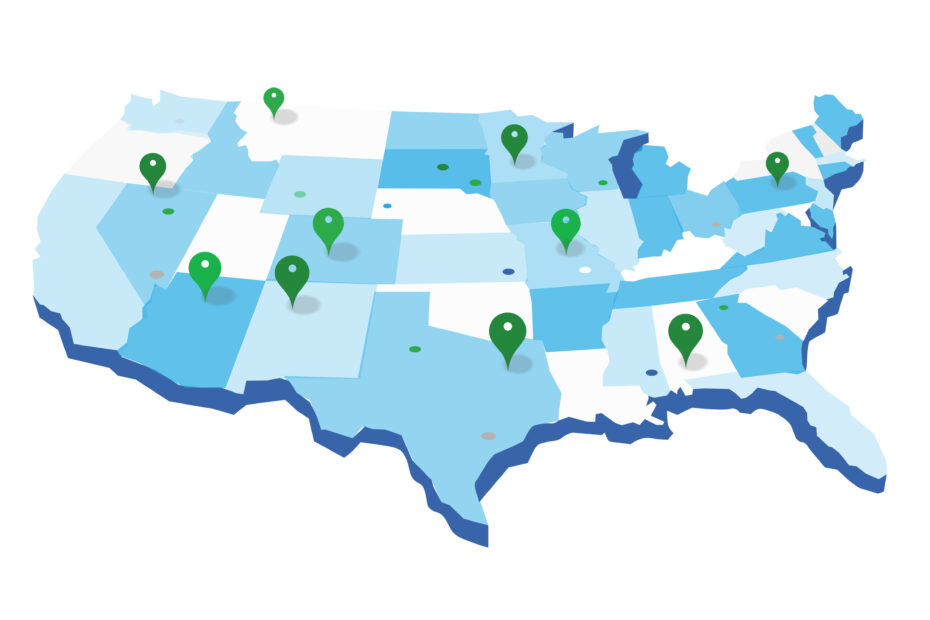When setting up a cooperative, one critical decision is where to organize it legally. While in many cases the easiest course is to organize in the state in which the cooperative will conduct business, in some cases there may be regulatory, tax, or other factors that favor organizing in another state. The analysis for cooperatives has an additional layer of complexity since the laws governing cooperatives and their formation vary widely from state to state. For that reason, the analysis must consider the type of cooperative being formed and the type of business it will conduct. This post explores the factors involved in deciding where to organize your cooperative legally.
A. Reasons for Organizing in the State of Operation
1. In-State Compliance and Benefits
Organizing your cooperative in the state where it operates simplifies compliance with local laws and regulations. Each state has specific rules regarding business operations, employees, tax filings, and licensing, and if the cooperative is organized in a different state, it may have to meet additional requirements or make additional filings in its state of operation. Also, there may be benefits that are only available to in-state cooperatives, such as state or local grants, loans, and incentives.
2. Ease of Governance and Reduced Legal Fees
In-state organizations can simplify governance and reduce legal disputes. A cooperative that incorporates in another state may need to hire attorneys licensed in that state to address legal issues or interpret its governing documents under foreign laws. A cooperative organized in another state also faces an additional layer of complexity if it becomes involved in a legal dispute in its state of operation. A cooperative organized in its state of operation can use local attorneys for most matters.
3. Local Credibility and Relationships
Cooperatives are typically dependent on relationships formed in their communities. Organizing in the state of operation signals commitment to the local economy and members in the community, potentially building goodwill. This local credibility is particularly vital for cooperatives dependent on community buy-in, such as food co-ops or worker co-ops, as it helps foster loyalty among members and stakeholders in the community.
4. Avoiding Foreign Qualification Requirements
If a cooperative is incorporated in another state and operates in the state in which it is physically located, it must register as a foreign entity in the state in which it operates. This process involves additional fees, documentation, and ongoing reporting obligations. By organizing in the state of operation, cooperatives avoid the administrative burden and extra costs associated with foreign qualification.
5. State-Specific Tax Benefits and Grant Programs
Some states offer tax incentives or exemptions specifically for cooperatives. For example, agricultural cooperatives or consumer cooperatives may qualify for state-level tax breaks, which could be lost if the cooperative organizes elsewhere. Some states may also offer grant or loan programs to cooperatives that are unavailable to cooperatives organized in another state.
6. Utilizing Securities Exemptions to Raise Capital
If a cooperative intends to raise capital from non-members in its state of operation through selling securities, such as preferred shares, state securities laws may require that the cooperative be organized in that state in order to take advantage of favorable exemptions from securities laws, such as the crowdfunding exemption.
B. Reasons for Organizing in Another State
1. Favorable Cooperative Laws
Some states, such as Wisconsin, California, and Colorado, have robust cooperative statutes that specifically address the organization of cooperatives. Some states, such as Georgia, do not have such statutes, and cooperatives are organized under general corporation and LLC statutes, and structured as cooperatives in their organizational documents. Cooperatives in such states may want to organize under another state statute that provides more definite requirements specific to cooperatives.
Also, another state might offer cooperative-specific statutes that are more flexible or advantageous than the home state’s laws. For example, Wyoming has progressive statutes for limited cooperative associations (LCAs), which could appeal to cooperatives with a mix of member and investor stakeholders. However, the cooperative will need to consider that the same result could be achieved in its home state by using an LLC and drafting its organizational documents to reach the same result.
2. Privacy Considerations
Some states, such as Delaware and Wyoming, offer enhanced privacy protections for business owners and members. Cooperatives that are concerned about shielding the identity of their board members, officers, or members from public records may have in interest in organizing in such states.
3. Potential Cost Savings
Although organizing in another state incurs foreign qualification fees, the savings in other areas may outweigh the cost. For example, some states have lower filing fees, ongoing compliance costs, or franchise taxes. Cooperatives with a wide geographic reach or significant online operations may find these cost advantages particularly beneficial.
4. Flexibility for Multi-State Operations
If a cooperative intends to operate in multiple states, organizing in a state with robust cooperative laws may provide greater operational flexibility. For example, a cooperative with members in several states might choose to incorporate in a state that offers clear legal guidelines for multi-state operations. This strategy can reduce legal ambiguity when managing a geographically diverse membership base.
5. Better Dispute Resolution Mechanisms
Certain states offer better mechanisms for resolving disputes within cooperatives. For instance, states like Delaware have specialized courts that handle business disputes more efficiently than general courts in other states. If a cooperative expects potential conflicts among members or stakeholders, organizing in such a state could be advantageous.
C. Key Considerations When Making the Decision
1. Nature of the Cooperative and its Operations
The type of cooperative and its line of business – whether it’s a worker cooperative, agricultural cooperative, or housing cooperative – must be considered in deciding where to organize. For example, agricultural cooperatives may benefit from organizing in a state with strong agricultural statutes, while worker cooperatives may prioritize states with labor-friendly laws. A cooperative that intends to rely on state grants and incentives may benefit from organizing in its home state.
2. Member Geography
If most of the cooperative’s members will reside in the same state, organizing in the cooperative’s home state may make the most sense in the absence of countervailing factors. However, if members are spread across multiple states, there may be no disadvantage to organizing in a state with flexible cooperative laws.
3. Costs and Administrative Burdens
The cooperative should consider the costs of organizing in another state, including foreign qualification fees, additional tax filings, and the potential need for out-of-state legal representation. These costs and additional time requirements will have to be balanced against any potential savings or benefits from favorable laws in another state.
4. Local Economic Impact
For cooperatives focused on community development, organizing in the cooperative’s home state can reinforce the cooperative’s mission of supporting the local economy. Conversely, incorporating elsewhere may undermine this commitment in the eyes of members and stakeholders.
5. Plans for Raising Capital
If a cooperative plans on raising capital through selling securities (such as preferred stock) in its home state, the cooperative will likely want to organize in its home state to take advantage of state exemptions from securities laws. Organizing in another state could make it more difficult and expensive, or in some cases impracticable, to sell preferred shares.
D. Conclusion
Deciding where to legally organize a cooperative is a critical step that depends on factors like the cooperative’s type, operational scope, financial plans, and long-term goals. While for most cooperatives organizing in the state of its operations will be the simplest and most cost-effective solution, under certain circumstances it may be advantageous to organize in another state to take advantage of cooperative-friendly laws. Consulting with legal and financial advisors familiar with cooperative structures can ensure the choice aligns with the cooperative’s mission and maximizes its potential for success.
For more information about this post’s content, please get in touch with Roland Hall at [email protected]

